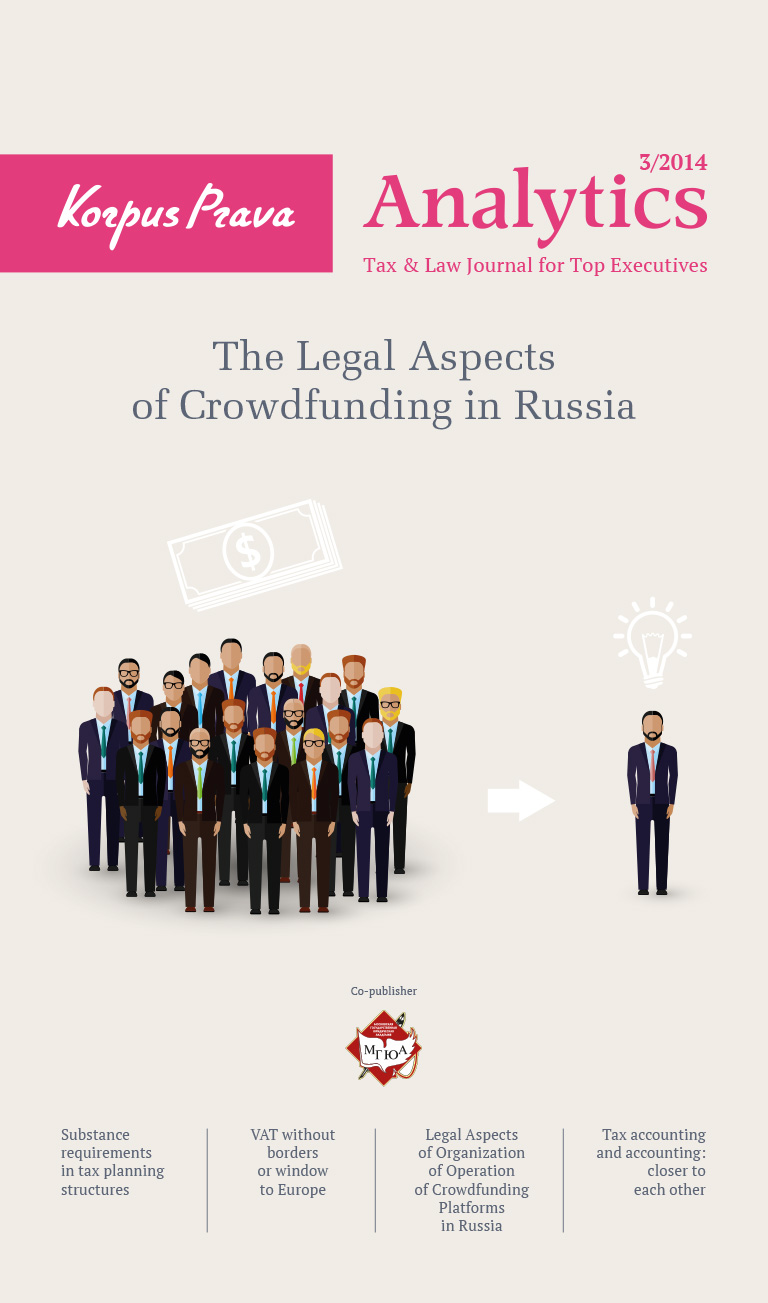- Cyprus Citizenship Scheme for Foreign Investors
- Squeezed But Pleased: Taxation of Passive Income in the European Union
- VAT Without Borders or Window to Europe
- Legal Aspects of Organization of Operation of Crowdfunding Platforms in Russia
- Substance Requirements in Tax Planning Structures
- “Deposit Splitting” of Individuals. Legal Civil and Criminal Aspects
The Main Rule of Reality Is Not to Get Lost in Your Illusions
As the world is getting smaller, the approach to tax planning tends to become less formal, but more substantial and transparent. Tax authorities now have more techniques to collect information about their taxpayers from different sources, therefore, preferential tax treatments allowing to take income out to tax-free jurisdictions gradually become history.
At the same time, international tax law regulations are based on activities performed by international organizations. In particular, the OECD activities give an opportunity to define international standards and regulation methods in the taxation field. Such standards and methods based on the accumulated experience are reproduced by the national state regulation.
BEPS1 Actions Plan as an important instrument of tax control
In 2013, the OECD developed BEPS2 Actions Plan, a plan against the tax base erosion and profit shifting.
The plan covers 15 interlinked focus areas. The main goal is to solve the problem of double non-taxation or incomplete taxation.
Objectives of the plan include risk control, increased transparency of operations, strengthening of tax sovereignty. BEPS steps are mandatory for the OECD member countries; the plan is recommended for implementation by outside observers (key partners and candidates).
Although Russia is not a member of the OECD, it is still guided by the OECD tax policy recommendations, as evidenced by the following innovations:
- Provisions regulating transfer pricing;
- Provisions on controlling foreign companies;
- Provisions on the actual income recipient;
- Joining the OECD Convention on Mutual Administrative Assistance in Tax Matters.
One of the techniques tax authorities have to collect information about their tax residents around the world is the international automatic exchange of financial information with competent authorities of foreign states (territories) (hereinafter – international exchange of information). As part of the international exchange (hereinafter – CRS-exchange), the process of collecting and reporting information is arranged as follows: financial institutions of all member countries collect certain information about their clients (individuals and legal entities), then submit the information to tax authorities of their country, and further, tax authorities exchange the data.
The exchange of information for the implementation of BEPS Actions Plan is based on the Unified standard for automatic exchange of financial information – Common Reporting standard (CRS) aimed at the identification of taxpayers’ foreign accounts (including their owners and account status).
In November, the OECD prepared a report on the exchange for 2018. In 2018, 86 jurisdictions exchanged information bilaterally for about 4,500 times. Each exchange contained detailed information about financial accounts under the submitting jurisdiction and owned by tax residents of the receiving jurisdiction.
11 jurisdictions exchange unilaterally (jurisdictions that only provide information):
- Anguilla;
- Bahamas;
- Bahrain;
- Bermuda;
- British Virgin Islands;
- Cayman Islands;
- Marshall Islands;
- Nauru;
- Qatar;
- Turks and Caicos Islands;
- United Arab Emirates.
As of 2018, the record number of exchanges (64 exchange partner jurisdictions) was performed by Denmark, Finland, Ireland, Luxembourg, Poland, Portugal, Spain.
The Russian Federation, the Marshall Islands, Montserrat, Saint Vincent and the Grenadines have not yet participated in the exchange for technical reasons, and at the moment these reasons are being addressed.
At the same time, in December 2018, the List of states (territories) with which the Russian Federation carries out automatic exchange of financial information was extended to include:
- Antigua and Barbuda;
- Hong Kong;
- Azerbaijan;
- Aruba;
- Macao;
- Bahamas;
- Bahrain;
- Vanuatu;
- Grenada;
- Qatar;
- Kuwait;
- Marshall Islands;
- Monaco;
- United Arab Emirates;
- Saint Kitts and Nevis3.
Antigua and Barbuda, Brunei, Dominica, Israel, Niue, Qatar, Saint Martin, Trinidad and Tobago, Turkey and Vanuatu do not participate in the exchange due to the lack of a legal framework, which they nevertheless plan to implement in the near future.
The international exchange of information provides for:
- Requiring by the financial market organization from its clients the information about such clients, beneficiaries and (or) persons directly or indirectly controlling them;
- Processing of such information, including document recording, and analysis of the adoption, including document recording, of reasonable and available measures under the circumstances to identify the tax residency of clients, beneficiaries and persons directly or indirectly controlling them;
- Verification of the accuracy and completeness of the information provided by the client, as well as its composition, conditions, procedure and terms of submission of this information to the federal executive body authorized to control and supervise taxes and duties.
The amount of information collected through the international exchange allows tax authorities to monitor:
- Tax residency of individuals;
- Controlled foreign companies owned by their tax residents;
- Actual income recipients and, therefore, valid application of preferential provisions of the double taxation treaty.
Control over the residence of individuals
When opening a bank account, a financial institution collects information and documents allowing to determine the tax residency of an individual as part of the procedures aimed at the admission and further monitoring of the client.
As a general rule, person’s acquisition of the country’s tax resident status depends on a number of factors, in particular:
- The number of days of stay in such country;
- Real estate held in the country;
- Actual locations of the management;
- Incorporation or registration locations for legal entities;
- Any other similar criterion.
Due to the variety of methods and criteria for determining the status, each member country of the exchange has developed its own rules for determining the tax residency4.
The OECD clarified procedures for the admission and further monitoring of clients that received tax residency/citizenship by investment schemes5.
While residency/citizenship by investment schemes allow individuals to obtain citizenship or residence rights through local investments for perfectly legitimate reasons, they may also be potentially misused in order to hide their assets offshore by escaping reporting, including under the international exchange of information. In particular, identity cards and other documents obtained through such schemes may potentially be misused to misrepresent taxpayer’s jurisdiction(s) of tax residency.
Potentially high-risk schemes are those that give access to a low personal income tax rate on offshore financial assets and do not require an individual to spend a significant amount of time to live under the jurisdiction of the tax residency offering such scheme.
Financial institutions are required to take the outcome of the OECD’s analysis of high-risk schemes into account when performing their CRS due diligence obligations.
The OECD has analysed over 100 schemes offered by member jurisdictions of the international exchange of information, and has identified potentially high-risk ones. For example, such schemes include conditions provided for by Cyprus, Malta, UAE, Saint Kitts and Nevis.
Controlled foreign companies owned by their tax residents
Upon opening a bank account, a financial institution collects information and documents as part of the procedures for the admission and further monitoring of clients, allowing to identify beneficiaries and persons directly or indirectly controlling them (clients), including verification of the accuracy and completeness of the information provided by clients.
Actual income recipients
The bank has information on incoming and outgoing payments on the client’s account, and it allows to track transit-related operations, for example, incoming dividends, which are transferred to the actual income recipient(s) in the same amount in a short period of time. It should be noted that the status of the actual income recipient should also be monitored by the sources of payment. Moreover, recent amendments to the Tax Code of the Russian Federation clarified the frequency of checking the status of the actual income recipient. The actual right to income shall be determined for each individual dividend income payment and/or group of income payments under one agreement.
Summary
Therefore, one may claim with a degree of certainty that in the future, both at the international and national levels, tax control will be strengthened, and the transparency of international structures and business processes will increase. In order to comply with current trends in tax planning, it is necessary to move away from “artificial” tax minimization schemes and focus on real business processes and economic feasibility of activity structuring.
- Base Erosion Profit Shifting.
- Base Erosion Profit Shifting.
- Order of the Federal Tax Service of Russia No. MMV-7-17/784@ dated 04.12.2018 “On the approval of the List of states (territories) with which the automatic exchange of financial information is performed”.
- http://www.oecd.org/tax/automatic-exchange/crs-implementation-and-assistance/tax-residency
- http://www.oecd.org/tax/automatic-exchange/crs-implementation-and-assistance/residence-citizenship-by-investment/
Your subscription to our journal will definitely boost the efficiency of your specialists and downsize your expenses for consultants.
The journal is available free of charge in the electronic version.
Free Download

